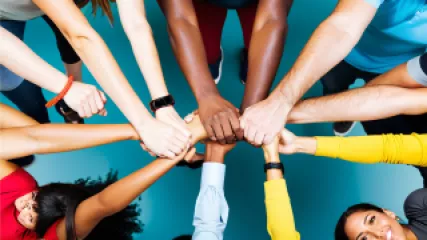Building Trust through Shared Experiences
Imagine a world where trust is the foundation of all relationships. A world where people come together, support one another, and work towards common goals. This ideal may seem far-fetched, but it is within our reach. In this article, we will explore the psychology of cooperation and how building trust through shared experiences plays a crucial role in fostering well-being and emotional wellness.
The Power of Cooperation
Cooperation is the act of working together towards a common goal. It is a fundamental aspect of human nature that has allowed us to achieve remarkable feats throughout history. From building civilizations to advancing technology, cooperation has been the key to our collective progress.
Cooperation not only benefits society as a whole but also has a profound impact on individual well-being. Numerous studies have shown that cooperation promotes positive emotions, reduces stress, and enhances overall mental health. When we cooperate, we feel a sense of belonging and purpose, which contributes to our overall happiness and life satisfaction.
Shared Experiences: Building Blocks of Trust
Trust is the foundation upon which cooperation thrives. Without trust, collaboration becomes challenging, and relationships suffer. So, how can we build trust and strengthen our ability to cooperate?
One powerful way is through shared experiences. When we engage in activities together, we create bonds and cultivate a sense of unity. Whether it's working on a project, participating in a team-building exercise, or even going through a challenging situation, shared experiences allow us to connect on a deeper level.
Sharing experiences requires vulnerability, openness, and empathy. It involves actively listening to others, understanding their perspectives, and finding common ground. By engaging in shared experiences, we build trust by demonstrating our willingness to collaborate and support one another.
A Personal Journey of Building Trust
To illustrate the transformative power of shared experiences in building trust, let me share a personal story. My name is Sarahi Parker, and I have always been passionate about community service and making a positive impact on others' lives.
A few years ago, I had the opportunity to volunteer at a local homeless shelter. I was assigned to a team of volunteers, each with different backgrounds and skills. Initially, we were all strangers, but our shared goal brought us together.
As we worked side by side, preparing meals, organizing donations, and providing support to the residents, we formed a tight-knit bond. Through our shared experiences, we learned to trust and rely on one another. We celebrated our successes and supported each other through the challenges we faced.
Over time, this trust extended beyond the walls of the shelter. We began collaborating on other projects, leveraging our diverse skills and perspectives to make a difference in our community. Our shared experiences laid the foundation for a lasting partnership based on trust and cooperation.
The Science Behind Trust and Cooperation
The connection between trust, cooperation, and well-being is not just anecdotal. Scientific research has shed light on the underlying mechanisms that make this relationship possible.
Studies have shown that when individuals engage in cooperative activities, the brain releases oxytocin, often referred to as the "trust hormone." Oxytocin plays a crucial role in building social bonds, promoting empathy, and enhancing trust. It reinforces positive emotions and fosters a sense of connection and cooperation.
Furthermore, research suggests that trust is contagious. When one person demonstrates trustworthiness, it creates a ripple effect, inspiring others to reciprocate and foster an environment of cooperation. This cycle of trust builds stronger relationships, enhances group dynamics, and ultimately contributes to individual and collective well-being.
Nurturing Trust and Cooperation
Building trust through shared experiences is an ongoing process that requires conscious effort and nurturing. Here are some strategies to foster cooperation and strengthen trust:
- Open Communication: Foster open and honest communication within groups or relationships. Encourage active listening, empathy, and respect for diverse perspectives.
- Collaborative Decision-Making: Involve everyone in the decision-making process to create a sense of ownership and shared responsibility. This promotes a cooperative mindset and strengthens trust.
- Clear Goals and Expectations: Establish clear goals and expectations for the group or relationship. This provides a common purpose and reduces misunderstandings, fostering trust and cooperation.
- Recognition and Appreciation: Recognize and appreciate the contributions of others. Celebrate achievements and acknowledge the value that each individual brings to the table. This cultivates a positive and supportive environment.
- Conflict Resolution: Address conflicts openly and constructively. Encourage dialogue, active listening, and finding mutually beneficial solutions. Resolving conflicts strengthens trust and builds stronger relationships.
Expanding the Circle of Cooperation
While building trust through shared experiences is essential within small groups or individual relationships, its impact can extend far beyond. Imagine a world where trust and cooperation are not limited to a select few but are embraced on a global scale.
When individuals and communities come together, driven by a shared vision of cooperation, remarkable things happen. We witness the power of collaboration in tackling global challenges, addressing social inequalities, and creating a more inclusive and sustainable future.
By recognizing the value of shared experiences in building trust, we can actively work towards creating a society that thrives on cooperation and emotional well-being.
Shared experiences allow us to connect on a deeper level. By engaging in them, we build trust by demonstrating our willingness to collaborate and support one another. Cooperation and trust go hand in hand, fostering positive emotions and enhancing overall mental health.Psychology Today
In conclusion, cooperation is not merely a means to an end, but a crucial element for individual and collective well-being. Building trust through shared experiences is a powerful tool that fosters cooperation, strengthens relationships, and enhances emotional wellness.
By actively engaging in cooperative activities, nurturing open communication, and embracing diverse perspectives, we can create a world where trust is the driving force behind our interactions. Let us embark on this journey together, building a future where cooperation and well-being are intertwined.






